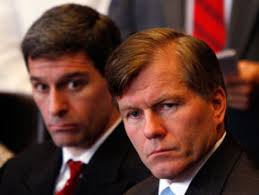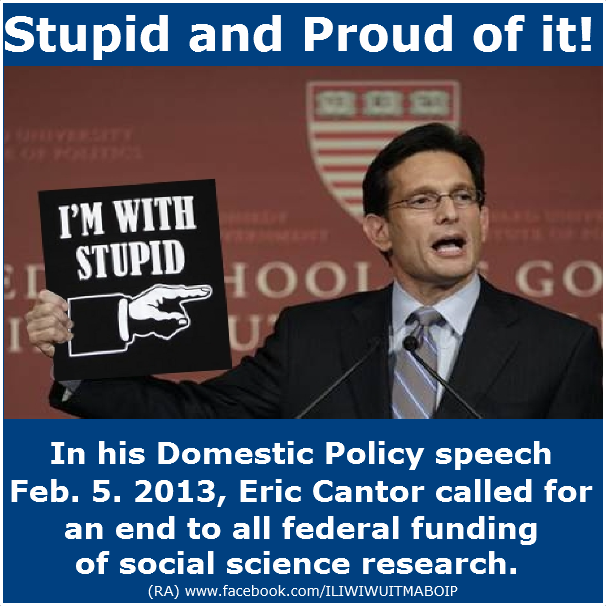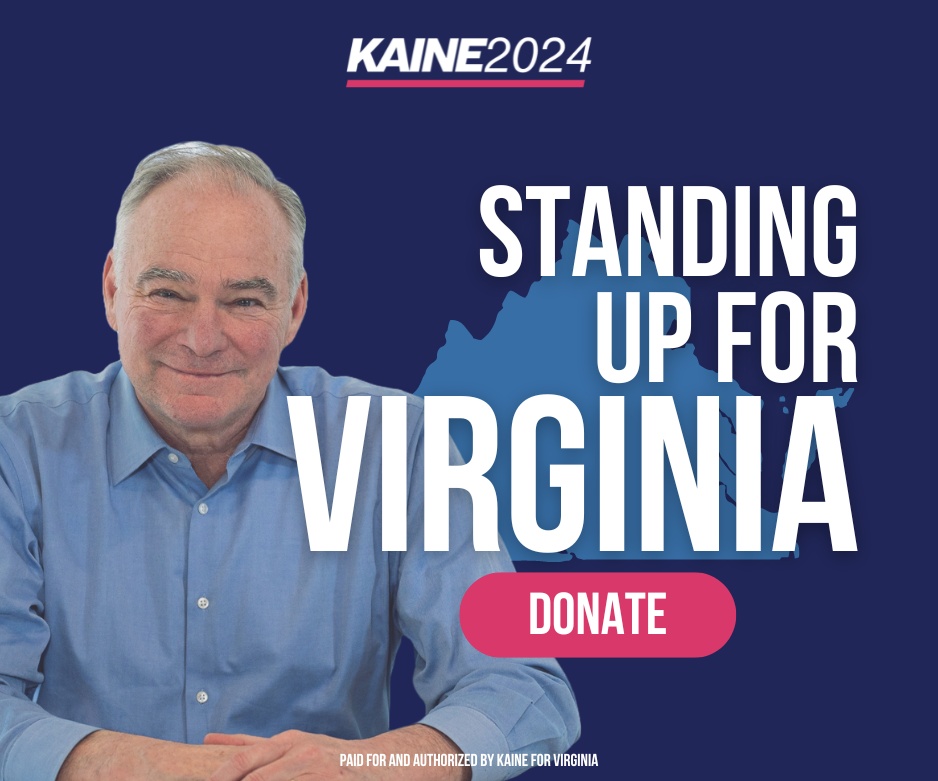( – promoted by lowkell)
 by Paul Goldman
by Paul Goldman
Keeping to my gut instinct from last year – that the 2013 transportation debate could decide the winner of the governor’s race by the Ides of March – let’s examine a populist political play that worked in Virginia’s past but is not being tried by either Bolling, Cuccinelli or McAuliffe on this issue.
I get the reason Bolling isn’t going populist here; he needs to back McD to the hilt on transportation to have any credibility as an independent candidate in this particular contest. Besides, “Twinky” (Bolling’s nickname) simply isn’t credible as a populist. I likewise get why McAuliffe isn’t going populist here. He is smart to stay silent and let Senate Democrats have the most room to negotiate. T-Mac can wait to see how the chess board plays out. It is the smart play for the front-runner.
Thus, by default or deduction, the populist play falls into Cuccinelli’s lap. What is the populist play against McD’s transportation plan? Namely, the elimination of the 17.5 cent per gallon gas tax will put millions of real dollars (not Bob Marshall play money) into the coffers of the big oil companies and their distributors, not into the wallets and purses of Virginia motorists. That is to say: the practical fiscal reality of the governor’s plan will be to make Virginians pay nearly $3 billion in new sales taxes to the government that they are currently not paying (using the same 5 year-time frame used in the current legislative debate) and enrich the oil companies by $billions of dollars in the process. This is not very populist is it?
The comeback from MCD and allies is this bit of populism, namely the elimination of the 17.5 cent per gallon gas tax, will cause gas prices at the pump to drop by roughly the same amount due to competition, since competitors would then have room to drop the price by this amount and still make their same profit. Thus, according to McD and his economic theorists, motorists will save $3.5 billion over this same five year period as money that once went for gas taxes will stay in their pockets.
But will gas prices at the pump really drop that much, assuming all things are equal in economic analysis? There is no way for the governor or anyone on his side of the debate to prove it. Or more to the point in terms of political argument: There is no way for the governor to disprove that his plan will not actually lead to the oil companies and their distributors pocketing much of the “savings,” a windfall for them.
In that case, therefore, Virginians will have been suckered, or so goes the populist argument. They are paying huge new taxes but not getting the saving promised at the pump. Lose-lose for the average family, big win for government and the oil companies. Thus, the potential power of the anti-McD populist argument.
“Liberal” populism is based in large measure on attacking big special interests such as oil companies for ripping off the consumer. “Conservative” populism is based in large measure on attacking big government, at the federal or state even local level, for ripping off the taxpayer. Thus, these tend to be dueling populist appeals at times: conservatives berating liberals for wanting to tax the people to feed the government, and liberals berating conservatives for their economic approach which allows big oil to rip off the people at the pump.
Rarely do the two populist appeals converge into one big political weapon to be used against both the Dem and GOP political establishment. Cool huh?
This year, Democrats in the General Assembly did try the anti-oil company populist appeal. But it got no traction because, in my analysis, it was coupled with a call for higher taxes. Thus, it ran into the counter force of the Republican populism based on attacks on feeding a wasteful, bloated government with more tax money. It is too complicated to break through the noise.
However: what if Cuccinelli tries to marry the liberal and conservative populism? He has the megaphone of a run for governor. As I have been pointing out, the politics of Cuccinelli and his side of the GOP opposing a transportation plan backed by both the Governor and Senate Democrats seems way too risky, if not fatal. I could be way wrong here, but this is how my game theory analysis comes out. but I am assuming he comes at the thing from the anti-tax, anti-government Tea Party angle.
However, if one assumes Cuccinelli does not want to back any such transportation plan, then he has two options:
1. Try to kill it in private by working with GOP Senators and Delegates opposed to the measure. Personally, I don’t see how this benefits him. It is lose-lose, he angers the governor either way big time.
2. Publicly oppose it from the liberal/conservative populist side. Lt. Governor Doug Wilder did this in 1986, opposing fellow Democratic Governor Jerry Baliles and his party on a transportation tax plan, saying it raised a regressive tax never used before, making people who didn’t use the roads to pay for stuff when buying baby formula and the like. The experts said he had committed political suicide. I was convinced backing the tax plan would be fatal. There was, and still is, no way to know the right decision on a political basis. He won, but maybe he wins bigger if he plays ball with the establishment.
So assuming Cuccinelli wants to try the Wilder route, he will need a political argument that can withstand criticism from all sides and be popular, or at least credible, with swing voters. Wilder could do it in part because Baliles had promised not to raise taxes, but did it a few months after winning the election.
This is year 4 for McDonnell: it is now or never for a transportation legacy. So if Ken Cuccinelli breaks with McD or his party on this, he is “all-in”; it is the ultimate populist play in the history of Virginia. But it has this advantage: it would be rooted in the populist argument on both the liberal and conservative sides of the same coin. No Republican has ever tried it before.
Cuccinelli could say this: While eliminating the gas tax would be popular – and he would surely like to do it – the fact remains what the governor and others want to do will enrich the big oil companies at the expense of average working class Virginians. He would then say – using conservative populism – that McD and his supporters want to make consumers pay billions of dollars in sales taxes on a phony promise sure to bite the average family. Then, using liberal populism, he will claim the oil companies will take advantage of not having to pay the gas tax to the government, but rather pocket that money, not lower prices as McD predicts. He would also need to say that the plan doesn’t eliminate the tolls scheduled to be paid in Tidewater, a key political background.
Would he be right about the public being suckered at the pump? The truth is, there would be no way to ever know for sure. In other words, in politics, one can’t disprove a negative. Thus, you can not disprove a claim that the oil companies will not lower their prices by the amount of the eliminated tax.
Moreover: Come September, there will be evidence on how gas prices have reacted to the change in the law since July 1. Who knows what conclusions will seem reasonable to the public at that point, or by election day?
If you go back to the 1970’s and 1980’s, liberal populist arguments against the special interests proved attractive to GOP and Democratic voters at times. This has been less so in recent years in state politics: Republicans have not made them, preferring their conservative populist anti-government argument and Democrats have shied away from populist arguments since they are seen as anti-business.
Now comes 2013. The business community has not rallied to Cuccinelli; indeed the AG made a big deal about going after Dominion Power. Bolling says the GOP side of this constituency supports him, but McAuliffe seems to sense a real chance at scoring inroads here and thus he is not likely to want to embrace what is seen by them as anti-business. Terry is playing it smart here. The anti-government conservative populism of Cuccinelli has basically been maxed out by his positions over the years.
Meaning: To the extent there still is a liberal populism afoot in Virginia, the AG basically can write his own ticket at this point. How credible would he be in this role, indeed can you play both sides of the coin in the same campaign? In theory, anti-tax and anti-special interest can be harmonized but it is tricky for sure at best.
In terms of transportation, it seems to rest on this fault line: Can you get sufficient traction on claim that eliminating the gas tax for a sales tax is a sucker play for consumers and a windfall for the oil companies? The basic claim is seemingly consistent with the historic cynicism of American politics.
My gut: If Cuccinelli decides to oppose any final transportation plan agreed to do by the House and Senate negotiators, then the populist argument might be his only way to do it and still have a chance to win this November.
Again, as I have written, game theory says a GOP gubernatorial nominee running in a three-way race against a Democrat siding with a GOP Governor and a GOP LG attacking Cuccinelli for opposing a Republican governor is a bridge too far, unless something unpredictable happens.
But if you are going to go that route, then a simple anti-tax conservatism isn’t enough to make it across that Rubicon. Cuccinelli will have to break out into full populist mode, and bet by election day there is sufficient evidence to cause a voter backlash against the General Assembly’s bipartisan transportation plan at the polls.
Did the liberal populist appeal die with Henry Howell, with Doug Wilder? Moreover, they were Democrats, not a Republican like Cuccinelli. The only time Howell got 50%, the same for Wilder, is when they combined an anti-tax conservative populism with their anti-special interest liberal populism.
No Republican in Virginia has ever managed to do both, even tried due to fear of alienating the business constituency in the party. But if these folks are not going to be with Cuccinelli anyway – and that is the vibe right now – then I ask: What does Cuccinelli have to lose by rolling the dice?
Moreover, it doesn’t take a weatherman to know which way the wind is blowing: he doesn’t want to back McDonnell’s sales tax trade, and he probably believes the liberal populist argument to some degree on big business and the oil companies.
Cuccinelli is the underdog right now. No one has ever been elected Governor when social issues are seen as his or her JOB #1. Cuccinelli as a liberal populist ala Henry Howell? They say if you live long enough, you get to see everything. That would qualify.

 Here are a few Virginia (and national) news headlines, political and otherwise, for Tuesday, February 12.
Here are a few Virginia (and national) news headlines, political and otherwise, for Tuesday, February 12.





![Sunday News: “Trump says it’s ‘too late’ after Harris agrees to Oct. 23 debate on CNN”; “Harris fundraising far outpacing Trump’s”; Thanks to Trump’s Far-Right SCOTUS, “Abortion Bans Killed Amber Nicole Thurman and Candi Miller”; Richmond Mayor’s Race “a contest between [Mosby] and Avula?”](https://bluevirginia.us/wp-content/uploads/2024/09/montage0922-100x75.jpg)